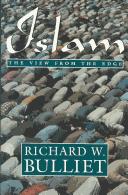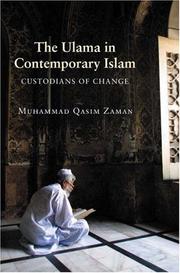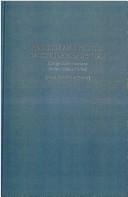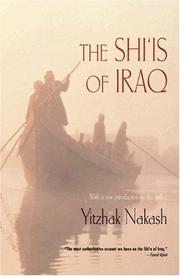| Listing 1 - 10 of 13 | << page >> |
Sort by
|
Multi
ISBN: 9781316227145 9781107106666 9781107514379 1316227146 1107106664 1107514371 1108506089 1108513530 1108515029 1108516513 110852396X 9781108523967 9781108506083 9781108513531 9781108515023 9781108516518 Year: 2017 Publisher: Cambridge, United Kingdom
Abstract | Keywords | Export | Availability | Bookmark
 Loading...
Loading...Choose an application
- Reference Manager
- EndNote
- RefWorks (Direct export to RefWorks)
Muslim scholars are a vital part of Islam, and are sometimes considered 'heirs to the prophets', continuing Muhammad's work of establishing Islam in the centuries after his death. But this was not always the case: indeed, Muslims survived the turmoil of their first century largely without the help of scholars. In this book, Jonathan Brockopp seeks to determine the nature of Muslim scholarly communities and to account for their emergence from the very beginning of the Muslim story until the mid-tenth century. By analysing coins, papyri and Arabic literary manuscripts from the ancient mosque-library of Kairouan, Tunisia, Brockopp offers a new interpretation of Muslim scholars' rise to positions of power and influence, serving as moral guides and the chief arbiters of Muslim tradition. This book will be of great benefit to scholars of comparative religion and advanced students in Middle Eastern history, Islamic Studies, Islamic Law and early Islamic literature.
Learning and scholarship --- Learning and scholarship. --- Muslim scholars. --- Ulama --- Ulama. --- History --- History. --- Islamic Empire. --- Muslim scholars --- HISTORY / Middle East / General.
Multi
ISBN: 9781501714856 1501714856 9781501714764 1501714767 9781501715211 Year: 2018 Publisher: Ithaca
Abstract | Keywords | Export | Availability | Bookmark
 Loading...
Loading...Choose an application
- Reference Manager
- EndNote
- RefWorks (Direct export to RefWorks)
Patriotic Ayatollahs explores the contributions of senior clerics in state and nation-building after the 2003 Iraq war. Caroleen Sayej suggests that the four so-called Grand Ayatollahs, the highest-ranking clerics of Iraqi Shiism, took on a new and unexpected political role after the fall of Saddam Hussein. Drawing on previously unexamined Arabic-language fatwas, speeches, and communiqués of Iraq's four grand ayatollahs, this book analyzes how their new pronouncements and narratives shaped public debates after 2003. Sayej argues that, contrary to standard narratives about religious actors, the Grand Ayatollahs were among the most progressive voices in the new Iraqi nation. She traces the transformative position of Ayatollah Sistani as the "guardian of democracy" after 2003. Sistani was, in particular, instrumental in derailing American plans that would have excluded Iraqis from the state-building process-a remarkable story in which an octogenarian cleric takes on the United States over the meaning of democracy. Patriotic Ayatollahs' counter-conventional argument about the ayatollahs' vision of a nonsectarian nation is neatly realized. Through her deep knowledge and long-term engagement with Iraqi politics, Sayej advances our understanding of how the post-Saddam Iraqi nation was built.
Political sociology --- Politics --- Ulama --- Islam and politics --- Nationalism --- Political activity --- History --- Iraq --- Politics and government
Book
ISBN: 0520036441 9780520036444 Year: 1978 Publisher: Berkeley: University of California press,
Abstract | Keywords | Export | Availability | Bookmark
 Loading...
Loading...Choose an application
- Reference Manager
- EndNote
- RefWorks (Direct export to RefWorks)
Ulama --- Sufism --- Shiites --- Women, Muslim --- Islam --- Religious Life --- History --- History of Asia --- anno 1500-1799 --- anno 1800-1999 --- Middle East --- Women, Muslim - Religious Life --- Islam - History

ISBN: 0231082185 9780231082181 Year: 1994 Publisher: New York (N.Y.): Columbia university press,
Abstract | Keywords | Export | Availability | Bookmark
 Loading...
Loading...Choose an application
- Reference Manager
- EndNote
- RefWorks (Direct export to RefWorks)
History --- Islam --- Iran --- Islam and state. --- Ulama --- History. --- -Islam and state --- -Islam --- -Mohammedanism --- Muhammadanism --- Muslimism --- Mussulmanism --- Religions --- Muslims --- Ulema --- Muslim scholars --- Mosque and state --- State and Islam --- State, The --- Ummah (Islam) --- Functionaries --- -History --- Islam and state --- Islam - History. --- Ulama - History. --- Islam - Iran - History.

ISBN: 1282964682 9786612964688 1400837510 9781400837519 0691096805 9780691096803 9780691130705 0691130701 9781282964686 6612964685 Year: 2002 Publisher: Princeton, N.J. Oxford Princeton University Press
Abstract | Keywords | Export | Availability | Bookmark
 Loading...
Loading...Choose an application
- Reference Manager
- EndNote
- RefWorks (Direct export to RefWorks)
From the cleric-led Iranian revolution to the rise of the Taliban in Afghanistan, many people have been surprised by what they see as the modern reemergence of an antimodern phenomenon. This book helps account for the increasingly visible public role of traditionally educated Muslim religious scholars (the `ulama) across contemporary Muslim societies. Muhammad Qasim Zaman describes the transformations the centuries-old culture and tradition of the `ulama have undergone in the modern era--transformations that underlie the new religious and political activism of these scholars. In doing so, it provides a new foundation for the comparative study of Islam, politics, and religious change in the contemporary world. While focusing primarily on Pakistan, Zaman takes a broad approach that considers the Taliban and the `ulama of Iran, Egypt, Saudi Arabia, India, and the southern Philippines. He shows how their religious and political discourses have evolved in often unexpected but mutually reinforcing ways to redefine and enlarge the roles the `ulama play in society. Their discourses are informed by a longstanding religious tradition, of which they see themselves as the custodians. But these discourses are equally shaped by--and contribute in significant ways to--contemporary debates in the Muslim public sphere. This book offers the first sustained comparative perspective on the `ulama and their increasingly crucial religious and political activism. It shows how issues of religious authority are debated in contemporary Islam, how Islamic law and tradition are continuously negotiated in a rapidly changing world, and how the `ulama both react to and shape larger Islamic social trends. Introducing previously unexamined facets of religious and political thought in modern Islam, it clarifies the complex processes of religious change unfolding in the contemporary Muslim world and goes a long way toward explaining their vast social and political ramifications.
Muslim scholars. --- Ulama. --- Islamic scholars --- Scholars, Muslim --- Scholars --- Ulema --- Islam --- Muslim scholars --- Functionaries --- Ulama --- #SBIB:316.331H421 --- #SBIB:39A10 --- Morfologie van de godsdiensten: Islam --- Antropologie: religie, riten, magie, hekserij --- Islam and politics. --- Ulémas --- Islam et politique --- Political sociology --- Middle East

ISBN: 0873954084 Year: 1980 Publisher: Albany, N.Y. State University of New York Press
Abstract | Keywords | Export | Availability | Bookmark
 Loading...
Loading...Choose an application
- Reference Manager
- EndNote
- RefWorks (Direct export to RefWorks)
Islam and politics --- Ulama --- Ulema --- Islam --- Muslim scholars --- Functionaries --- Iran --- Politics and government --- Sociology of religion --- anno 1920-1929 --- anno 1930-1939 --- anno 1940-1949 --- anno 1950-1959 --- anno 1960-1969 --- anno 1970-1979
Book
ISBN: 9780804773119 0804773114 Year: 2011 Publisher: Stanford, Calif. Stanford University Press
Abstract | Keywords | Export | Availability | Bookmark
 Loading...
Loading...Choose an application
- Reference Manager
- EndNote
- RefWorks (Direct export to RefWorks)
To better understand the diverse inheritance of Islamic movements in present-day Turkey, we must take a closer look at the religious establishment, the ulema, during the first half of the twentieth century. During the closing years of the Ottoman Empire and the early decades of the Republic of Turkey, the spread of secularist and anti-religious ideas had a major impact on the views and political leanings of the ulema. This book explores the intellectual debates and political movements of the religious establishment during this time.Bein reveals how competing visions of development
Islam and state --- Islam --- Muslim scholars --- Secularism --- Ulama --- History --- Functionaries --- Turkey --- Religious aspects. --- Islam - Turkey - Functionaries - History - 20th century. --- Islam -- Turkey -- Functionaries -- History -- 20th century. --- Islam and state - Turkey - History - 20th century. --- Islam and state -- Turkey -- History -- 20th century. --- Muslim scholars - Turkey - History - 20th century. --- Muslim scholars -- Turkey -- History -- 20th century. --- Secularism - Turkey - History - 20th century. --- Secularism -- Turkey -- History -- 20th century. --- Turkey - History - Revolution, 1918-1923 - Religious aspects. --- Turkey -- History -- Revolution, 1918-1923 -- Religious aspects. --- Ulama - Turkey - History - 20th century. --- Ulama -- Turkey -- History -- 20th century. --- Religion --- Philosophy & Religion --- 20TH CENTURY -- 322 --- TURKEY -- 27 --- OTTOMAN EMPIRE -- 27 --- TURKISH REPUBLIC -- 27 --- 20TH CENTURY -- 27 --- History of Southern Europe --- anno 1910-1919 --- anno 1900-1909 --- anno 1920-1929
Book
ISBN: 9781787383944 1787383946 Year: 2021 Publisher: London Hurst & Company
Abstract | Keywords | Export | Availability | Bookmark
 Loading...
Loading...Choose an application
- Reference Manager
- EndNote
- RefWorks (Direct export to RefWorks)
The Arab revolutions of 2011 were a transformative moment in the modern history of the Middle East, as people rose up against long-standing autocrats throughout the region to call for 'bread, freedom and dignity'. With the passage of time, results have been decidedly mixed, with tentative success stories like Tunisia contrasting with the emergence of even more repressive dictatorships in places like Egypt, with the backing of several Gulf states. Focusing primarily on Egypt, this book considers a relatively understudied dimension of these revolutions: the role of prominent religious scholars. While pro-revolutionary ulama have justified activism against authoritarian regimes, counter-revolutionary scholars have provided religious backing for repression, and in some cases the mass murder of unarmed protestors. Usaama al-Azami traces the public engagements and religious pronouncements of several prominent ulama in the region, including Yusuf al-Qaradawi, Ali Gomaa and Abdullah bin Bayyah, to explore their role in either championing the Arab revolutions or supporting their repression. He concludes that while a minority of noted scholars have enthusiastically endorsed the counter-revolutions, their approach is attributable less to premodern theology and more to their distinctly modern commitment to the authoritarian state.
Arab Spring, 2010 --- -Revolutions --- Ulama --- Ulema --- Islam --- Muslim scholars --- Insurrections --- Rebellions --- Revolts --- Revolutionary wars --- History --- Political science --- Political violence --- War --- Government, Resistance to --- Arab Awakening, 2010 --- -Religious aspects --- Political activity --- Functionaries --- Social change --- Sociology of religion --- Community organization --- Political systems --- anno 2010-2019 --- Middle East --- Arab states --- Religious aspects
Book
ISBN: 9781107609907 9781107026414 9781139207720 1139207725 1107026415 1107609909 9781139616348 113961634X 9781139625647 1139625640 9781139612623 113961262X 1139610767 Year: 2013 Volume: 41 Publisher: New York Cambridge University Press
Abstract | Keywords | Export | Availability | Bookmark
 Loading...
Loading...Choose an application
- Reference Manager
- EndNote
- RefWorks (Direct export to RefWorks)
While Syria has been dominated since the 1960s by a determinedly secular regime, the 2011 uprising has raised many questions about the role of Islam in the country's politics. This book demonstrates that with the eradication of the Muslim Brothers after the failed insurrection of 1982, Sunni men of religion became the only voice of the Islamic trend in the country. Through educational programs, charitable foundations and their deft handling of tribal and merchant networks, they took advantage of popular disaffection with secular ideologies to increase their influence over society. In recent years, with the Islamic resurgence, the Alawi-dominated Ba'thist regime was compelled to bring the clergy into the political fold. This relationship was exposed in 2011 by the division of the Sunni clergy between regime supporters, bystanders and opponents. This book affords a new perspective on Syrian society as it stands at the crossroads of political and social fragmentation.
Ulama --- Ulémas --- Political activity --- Activité politique --- Ḥizb al-Baʻth al-ʻArabī al-Ishtirākī (Syria) --- Syria --- Syrie --- Politics and government --- Politique et gouvernement --- anno 2010-2019 --- Sociology of religion --- Internal politics --- anno 2000-2009 --- anno 1900-1999 --- Islam and politics --- Islam and state --- Ulema --- Islam --- Muslim scholars --- Functionaries --- Ḥizb al-ʻArabī al-Ishtirākī --- Arab Renaissance (Baʻth) Socialist Party --- Arab Socialist Baath Party --- Arab Socialist Renaissance Party --- Ḥizb al-Baʻth --- Syrian Baath Party --- Baath Party (Syria) --- Baʻth Party (Syria) --- Bāsutō --- Arabu Fukkō Shakaitō --- Baʻat' (Political party : Syria) --- Ḥizb al-Baʻth al-ʻArabī al-Ishtirākī --- Parti Baass arabe socialiste (Syria) --- Parti arabe socialiste (Syria) --- Baass (Syria) --- Parti Baass (Syria) --- בעת׳ --- حرب البعث العربي الاشتراكي (Syria) --- حزب البعث العربي الإشتراكي (سوريا) --- حزب البعث العربي الإشتراكي (سورية) --- حزب البعث العربي الاشتراكي --- حزب البعث العربي الاشتراكي (سير) --- حزب البعث العربي الاشتراكي (Syria) --- Sirii︠a︡ --- Iqlīm al-Sūrī (United Arab Republic) --- Iqlīm al-Shamālī (United Arab Republic) --- Syrian Region (United Arab Republic) --- سوريا --- Sūriyā --- Jumhūrīyah al-ʻArabīyah al-Sūrīyah --- Syrian Arab Republic --- République arabe syrienne --- Sowria --- R.A.S. --- RAS --- Ittiḥād al-Duwal al-Sūrīyah --- Fédération des États de Syrie --- Syrische Arabische Republik --- SAR --- Suryah --- Arabska Republika Syryjska --- Syrien --- Jumhuriya al-Arabya as-Suriya --- Repubblica Araba Siriana --- جمهورية العربية السورية --- Jumhūriyyah al-ʻArabiyyah as-Sūriyyah --- Сірыя --- Siryi︠a︡ --- Сірыйская Арабская Рэспубліка --- Siryĭskai︠a︡ Arabskai︠a︡ Rėspublika --- Сирийската арабска република --- Siriĭskata arabska republika --- Συρία --- Αραβική Δημοκρατία της Συρίας --- Aravikē Dēmokratia tēs Syrias --- 시리아 --- Siria --- סוריה --- רפובליקה הערבית הסורית --- Republiḳah ha-ʻArvit ha-Surit --- シリア --- Shiria --- Сирия --- Сирийская Арабская Республика --- Siriĭskai︠a︡ Arabskai︠a︡ Respublika --- Сирія --- Syrii︠a︡ --- Сирійська Арабська республіка --- Syriĭsʹka Arabsʹka respublika --- 敘利亞 --- Xuliya --- United Arab Republic --- Ulama - Political activity - Syria --- Islam and politics - Syria --- Islam and state - Syria --- Syria - Politics and government - 20th century --- Syria - Politics and government - 21st century --- Social Sciences --- Political Science

ISBN: 0691115753 0691190445 9780691115757 Year: 2003 Publisher: Princeton: Princeton university press,
Abstract | Keywords | Export | Availability | Bookmark
 Loading...
Loading...Choose an application
- Reference Manager
- EndNote
- RefWorks (Direct export to RefWorks)
The Shi'is of Iraq provides a comprehensive history of Iraq's majority group and its turbulent relations with the ruling Sunni minority. Yitzhak Nakash challenges the widely held belief that Shi'i society and politics in Iraq are a reflection of Iranian Shi'ism, pointing to the strong Arab attributes of Iraqi Shi'ism. He contends that behind the power struggle in Iraq between Arab Sunnis and Shi'is there exist two sectarian groups that are quite similar. The tension fueling the sectarian problem between Sunnis and Shi'is is political rather than ethnic or cultural, and it reflects the competition of the two groups over the right to rule and to define the meaning of nationalism in Iraq. A new introduction brings this book into the new century and illuminates the role that Shi`is could play in postwar Iraq.
Shiites
---
Shīʻah
---
Chiites
---
Chiisme
---
History.
---
History
---
Political activity.
---
Histoire
---
Activité politique
---
Iraq
---
Irak
---
Religious life and customs.
---
Vie religieuse
---
Sociology of religion
---
Islam
---
National movements
---
anno 1900-1999
---
Shiah
---
Shiites.
---
Shīʻah.
---
Schiiten
---
Sjiʻisme.
---
Iraq.
---
Irak.
---
Shia Muslims
---
Shiah Muslims
---
Shiahs
---
Shias
---
Shiite Muslims
---
Muslims
---
Imamites
---
Shia
---
Shiism
---
Twelvers (Islam)
---
Islamic sects
---
Alids
---
Schia
---
Ahl aš-šīʿa
---
Shiʻa
---
Schiʻism
---
Republik Irak
---
Irāq
---
ʿIrāq
---
al-Gumhūrīya-Irāqīya
---
<
| Listing 1 - 10 of 13 | << page >> |
Sort by
|

 Search
Search Feedback
Feedback About UniCat
About UniCat  Help
Help News
News